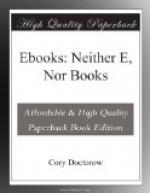1. Ebooks aren’t marketing. [Ebooks aren’t marketing] Ok, so ebooks are marketing: that is to say that giving away ebooks sells more books. Baen Books, who do a lot of series publishing, have found that giving away electronic editions of the previous installments in their series to coincide with the release of a new volume sells the hell out of the new book — and the backlist. And the number of people who wrote to me to tell me about how much they dug the ebook and so bought the paper-book far exceeds the number of people who wrote to me and said, “Ha, ha, you hippie, I read your book for free and now I’m not gonna buy it.” But ebooks shouldn’t be just about marketing: ebooks are a goal unto themselves. In the final analysis, more people will read more words off more screens and fewer words off fewer pages and when those two lines cross, ebooks are gonna have to be the way that writers earn their keep, not the way that they promote the dead-tree editions.
2. Ebooks complement paper books. [Ebooks complement paper books]. Having an ebook is good. Having a paper book is good. Having both is even better. One reader wrote to me and said that he read half my first novel from the bound book, and printed the other half on scrap-paper to read at the beach. Students write to me to say that it’s easier to do their term papers if they can copy and paste their quotations into their word-processors. Baen readers use the electronic editions of their favorite series to build concordances of characters, places and events.
3. Unless you own the ebook, you don’t 0wn the book [Unless you own the ebook, you don’t 0wn the book]. I take the view that the book is a “practice” — a collection of social and economic and artistic activities — and not an “object.” Viewing the book as a “practice” instead of an object is a pretty radical notion, and it begs the question: just what the hell is a book? Good question. I write all of my books in a text-editor [text editor screengrab] (BBEdit, from Barebones Software — as fine a text-editor as I could hope for). From there, I can convert them into a formatted two-column PDF [two-up screengrab]. I can turn them into an html file [browser screengrab]. I can turn them over to my publisher, who can turn them into galleys, advanced review copies, hardcovers and paperbacks. I can turn them over to my readers, who can convert them to a bewildering array of formats [download page screengrab]. Brewster Kahle’s Internet Bookmobile can convert a digital book into a four-color, full-bleed, perfect-bound, laminated-cover, printed-spine paper book in ten minutes, for about a dollar. Try converting a paper book to a PDF or an html file or a text file or a RocketBook or a printout for a buck in ten minutes! It’s ironic, because one of the frequently cited reasons for preferring paper to ebooks is that paper books confer a sense of ownership of a physical object. Before the dust settles on this ebook thing, owning a paper book is going to feel less like ownership than having an open digital edition of the text.




